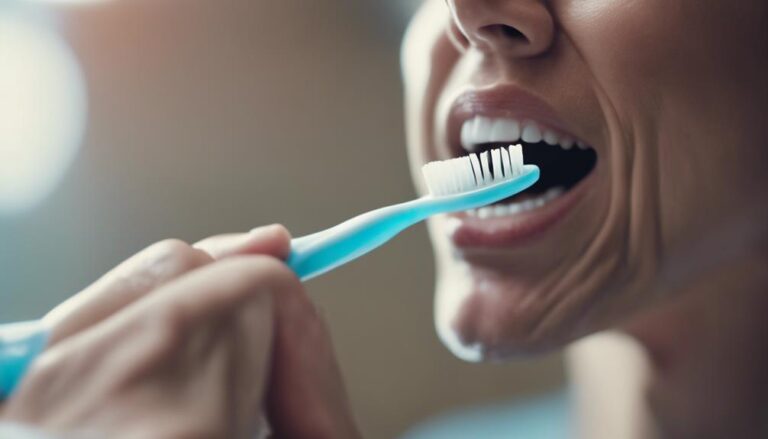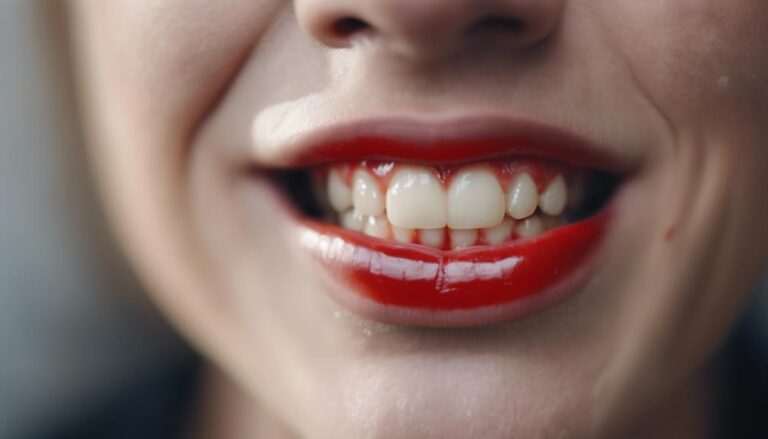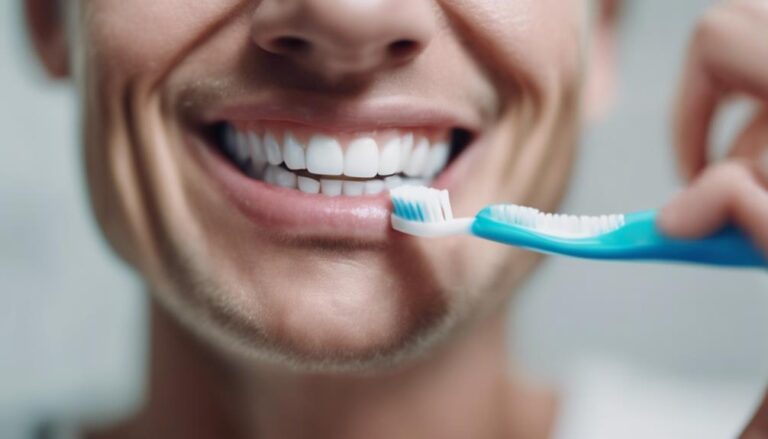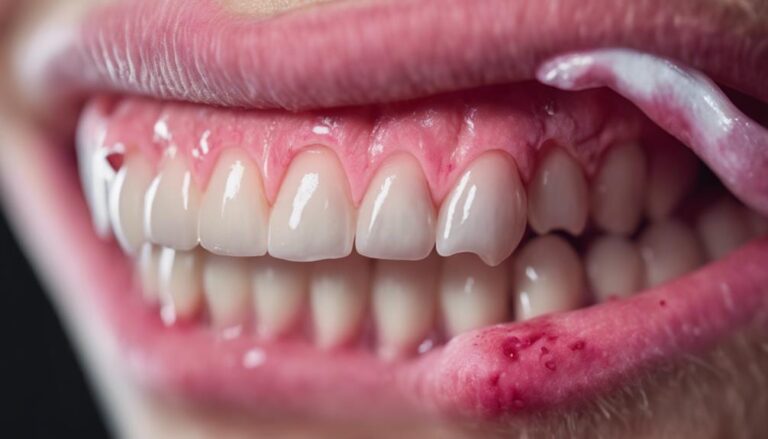To tackle bad breath effectively, practice these top oral hygiene tips: Brush properly at a 45-degree angle to remove plaque. Use a tongue scraper daily to reduce bacteria. Floss consistently to clear debris between teeth. Opt for alcohol-free mouthwash with antibacterial properties. Stay hydrated to promote saliva production and prevent dry mouth. Schedule regular dental checkups for professional cleanings and personalized advice. Remember, fresh breath is achievable with these essential routines. 😉
Key Takeaways
- Proper brushing techniques at a 45-degree angle remove plaque effectively.
- Use tongue scraping to reduce oral bacteria causing bad breath.
- Floss daily to remove plaque between teeth for fresher breath.
- Choose alcohol-free mouthwash with antibacterial properties.
- Stay hydrated to promote saliva production and prevent dry mouth.
Brushing Techniques
When maintaining proper oral hygiene to combat bad breath, mastering effective brushing techniques is essential. To guarantee optimal plaque removal and fresh breath, it’s vital to hold the toothbrush at a proper angle. Position the bristles at a 45-degree angle towards the gum line to target the areas where bacteria tend to accumulate. This technique allows for thorough cleaning along the gum line and between teeth, preventing the buildup of odor-causing bacteria.
In addition to the angle, applying gentle pressure while brushing is paramount. Aggressive brushing can damage the enamel, irritate the gums, and lead to sensitivity. Using gentle pressure helps to dislodge plaque and food particles without harming the teeth and gums. Remember, it’s the thoroughness of the brushing technique, not the force applied, that guarantees a healthy mouth and fresh breath.
Tongue Scraping
To further enhance oral hygiene and combat bad breath, let’s now explore the practice of tongue scraping.
Tongue scraping is a simple yet effective method to reduce oral bacteria and improve overall oral health. The tongue harbors a significant amount of oral bacteria, which can contribute to bad breath. By gently scraping the surface of the tongue with a tongue scraper, you can remove these bacteria, preventing them from proliferating and causing malodor.
Moreover, tongue scraping can also help in maintaining the health of your taste buds. When the tongue is coated with a layer of bacteria, it can affect your ability to taste food properly. Removing this bacterial layer through scraping can enhance your taste perception and make eating a more enjoyable experience.
Incorporating tongue scraping into your daily oral hygiene routine can complement brushing and flossing, providing holistic care for your mouth. Remember, a clean tongue not only promotes fresher breath but also supports overall oral health.
Flossing Routine
Implementing a consistent flossing routine is essential for effectively removing plaque and debris from between teeth to maintain peak oral health. Proper technique is vital for maximizing the benefits of flossing. To guarantee a thorough clean, use about 18 inches of floss and wrap it around your middle fingers, leaving about 1-2 inches of floss to work with.
Gently slide the floss between each tooth in a sawing motion, curving it into a ‘C’ shape around the tooth and moving it up and down to remove plaque. Make sure to reach below the gum line but be gentle to avoid causing damage.
Flossing should be a daily habit to prevent the buildup of plaque, which can lead to bad breath and other dental issues. By incorporating flossing into your oral hygiene routine, you can effectively remove debris that brushing alone may miss, promoting healthier gums and fresher breath. Remember, consistency is key when it comes to maintaining peak oral health.
Mouthwash Selection
Choosing the right mouthwash is essential for maintaining excellent oral hygiene and effectively fighting bad breath. When selecting a mouthwash, consider options that are alcohol-free and contain natural ingredients.
Here are some key points to keep in mind:
- Alcohol-Free Options: Opt for mouthwashes that are alcohol-free to avoid drying out the mouth, which can actually worsen bad breath in the long run.
- Natural Ingredients: Look for mouthwashes that contain natural ingredients like tea tree oil, peppermint, or eucalyptus, as these can help fight bacteria that cause bad breath without harsh chemicals.
- Antibacterial Properties: Choose a mouthwash with antibacterial properties to help kill odor-causing bacteria in the mouth.
- Fluoride Content: Consider a mouthwash with fluoride to help strengthen tooth enamel and prevent cavities.
- ADA Seal of Approval: Look for the American Dental Association (ADA) seal on the mouthwash, ensuring it has been clinically tested for safety and effectiveness.
Hydration Importance
Exploring the connection between hydration and oral health reveals an essential aspect of combating bad breath effectively. Hydration plays an important role in maintaining good oral health and preventing bad breath. Staying adequately hydrated is significant as saliva, our natural mouthwash, helps cleanse the mouth of food particles and bacteria that can lead to foul odors. Dehydration can reduce saliva production, leading to dry mouth, a common cause of bad breath.
The importance of hydration in oral health can’t be overstated. Drinking an adequate amount of water throughout the day is key to preventing dry mouth and promoting saliva production. Additionally, water helps rinse away food particles and bacteria that can contribute to bad breath. Ensuring proper hydration levels not only benefits oral health but also has a positive impact on overall well-being.
Regular Dental Checkups
Maintaining regular dental checkups plays a significant role in ensuring excellent oral health and preventing potential issues like bad breath. These appointments are important for preventive care and maintaining excellent dental hygiene. Here are some key reasons why regular dental checkups are essential:
- Early Detection: Regular checkups allow dentists to detect any oral health issues early, preventing them from developing into more serious problems.
- Professional Cleaning: Professional cleanings help remove plaque and tartar buildup, which can contribute to bad breath and other oral health issues.
- Education: Dentists provide valuable education on proper oral hygiene techniques and practices to maintain healthy teeth and gums.
- Treatment Planning: Through regular checkups, dentists can create personalized treatment plans to address any existing dental concerns and prevent future issues.
- Overall Health: Maintaining good oral health through regular checkups has been linked to improved overall health, emphasizing the importance of preventive care in dentistry.
Healthy Diet Impact
A vital diet plays a significant role in impacting oral health and addressing issues like bad breath. Food choices directly influence the balance of bacteria in the mouth, which can either contribute to or combat bad breath. Opting for a diet rich in fruits and vegetables can help maintain oral health by providing essential nutrients that support overall mouth function.
Nutritional balance is key when it comes to combating bad breath. Foods high in sugar and acidic content can lead to an imbalance in oral bacteria, causing bad breath. On the other hand, foods like crunchy fruits and vegetables can help clean teeth naturally and increase saliva production, which aids in washing away food particles and bacteria that cause bad breath.
Incorporating foods that are rich in vitamin C, such as oranges and kiwis, can also help prevent gum disease and promote gum health, reducing the likelihood of bad breath. Additionally, staying hydrated by drinking plenty of water throughout the day can help flush out bacteria and food debris that may lead to halitosis. Remember, a well-rounded diet not only benefits your overall health but also plays an essential role in maintaining fresh breath.
Frequently Asked Questions
Can Certain Medications Contribute to Bad Breath?
Certain medications can indeed contribute to bad breath due to their side effects. It’s essential to understand these potential effects and consult healthcare providers if experiencing persistent issues. Underlying health conditions can also play a role.
Is Bad Breath Linked to Sinus or Throat Infections?
Sinus inflammation may contribute to bad breath due to postnasal drip. Throat bacteria from infections can also lead to halitosis. Addressing these underlying issues through proper medical treatment and good oral hygiene can help alleviate bad breath.
Can Stress or Anxiety Cause Chronic Bad Breath?
Like a storm brewing in the distance, mental health can impact bad breath. Stress and anxiety alter saliva production, leading to dry mouth and halitosis. Prioritizing emotional well-being through self-care can help mitigate chronic bad breath.
Are There Specific Foods That Naturally Freshen Breath?
Eating fresh herbs like parsley or mint can naturally freshen breath. Proper hydration and a diet rich in crunchy fruits and vegetables can also help. Herbal solutions like peppermint tea are natural remedies worth trying.
Can Hormonal Changes Affect Breath Odor?
Hormonal changes can lead to breath odor due to hormonal imbalance affecting saliva production. Additionally, diet habits can influence the compounds released during digestion, impacting breath odor. Understanding these factors can help manage bad breath effectively.
Conclusion
To sum up, maintaining good oral hygiene practices is crucial for combating bad breath. By incorporating proper brushing techniques, tongue scraping, flossing regularly, choosing the right mouthwash, staying hydrated, scheduling regular dental checkups, and eating a healthy diet, you can guarantee fresh breath and a healthy mouth.
Remember, a little effort in your oral care routine goes a long way in creating a pleasant and inviting atmosphere for those around you.






